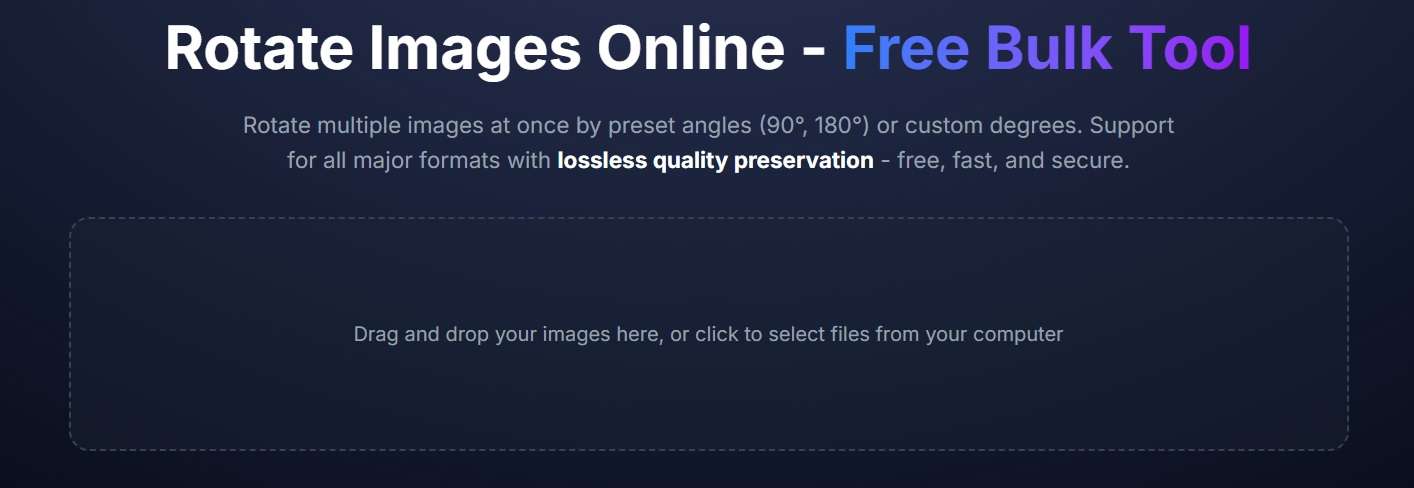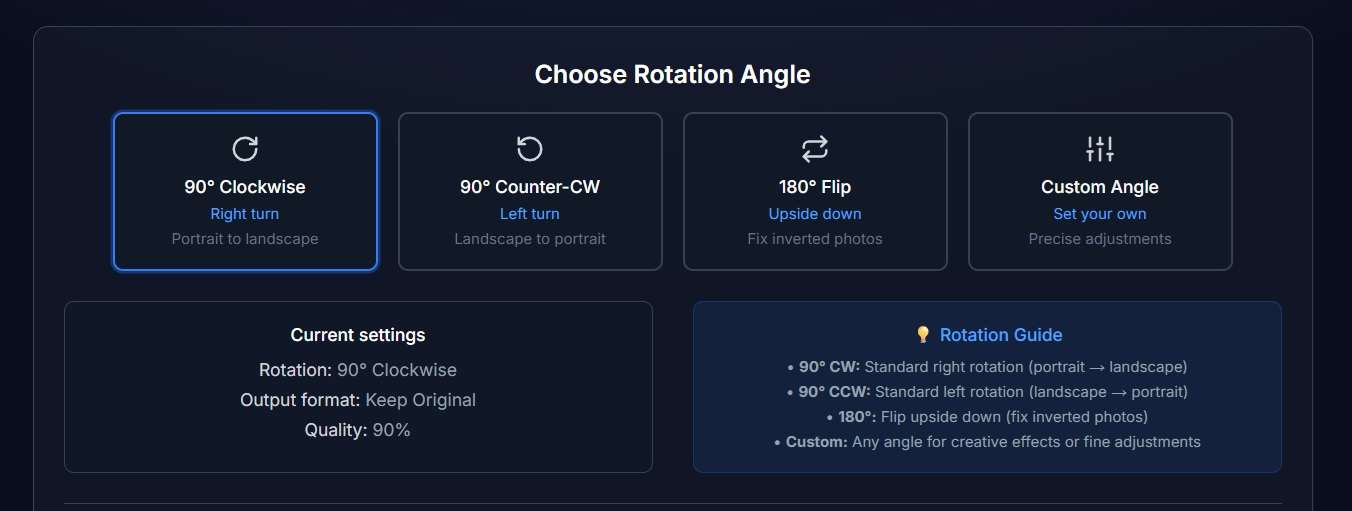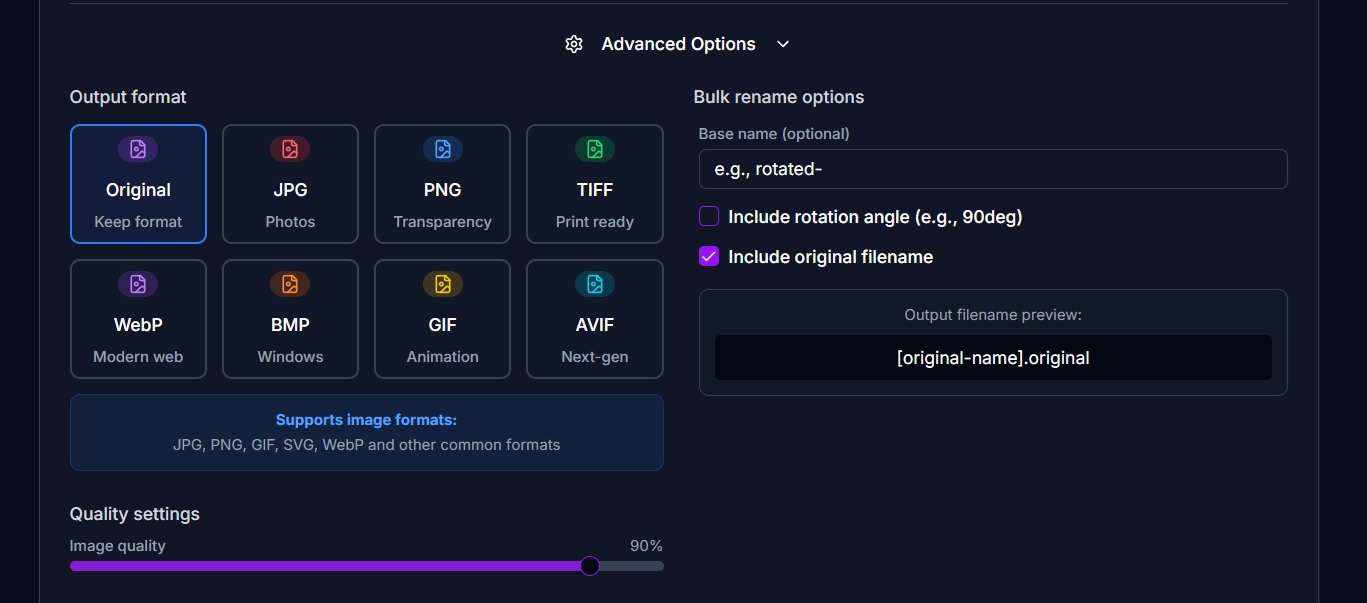How to Bulk Rotate Images: Complete 2025 Guide - ImagiTool
Learn how to bulk rotate multiple images at once quickly and easily. Discover the best free tools for rotating images by 90°, 180°, or custom angles in batches.
Alex Rodriguez
Photography workflow specialist with 10+ years optimizing image processing

How to Bulk Rotate Images: Complete 2025 Guide for Batch Image Rotation
Rotating multiple images one by one is tedious and time-consuming. Whether you're a photographer correcting camera orientation, a content creator preparing social media assets, or handling document scans, learning how to bulk rotate images efficiently can save hours of manual work.
This concise guide covers the best methods to rotate multiple images at once across platforms, with a focus on fast, free online solutions.
Why Bulk Rotate Images?
Common scenarios requiring batch image rotation include:
- Fixing incorrect camera orientation from shoots
- Rotating scanned pages to proper reading orientation
- Adapting images for social media platforms
- Preparing marketing materials with uniform layouts
Most Common Rotation Needs
- 90° Clockwise: Portrait to landscape
- 90° Counterclockwise: Landscape to portrait
- 180° Rotation: Flip upside down
- Custom Angles: Fine-tune horizon, fix tilts, creative effects
The Fastest Way: Online Bulk Image Rotation Tool
The quickest method is using an online bulk rotate tool. ImagiTool's Image Rotation Tool offers:
- Unlimited images per batch
- Preset angles (90°, 180°) and custom degrees
- No software install, works on any device
- Lossless rotation for 90°/180°
- Secure, auto-deletes files after 1 hour
How to Bulk Rotate Images Online
Step 1: Upload Your Images

- Visit the rotate image tool
- Drag and drop or select multiple images (JPG, PNG, GIF, SVG, WebP)
Step 2: Choose Rotation Angle

- Select 90° CW, 90° CCW, 180°, or set a custom angle
- Optionally enlarge background for custom angles
Step 3: Advanced Settings (Optional)

- Choose output format or keep original
- Adjust quality for lossy formats
- Set up bulk rename options
Step 4: Rotate & Download

- Click "Rotate Images" to process
- Download results individually or as a ZIP
Other Ways to Batch Rotate Images
Windows
- Photos App: Select images, open with Photos, use rotate, save.
- IrfanView: Batch conversion, set rotation, process.
- PowerToys: Select images, right-click, use Resize/Rotate.
Mac
- Preview: Open images, select all, rotate, save.
- Automator: Create workflow, add "Rotate Images" action.
Photoshop
Record a rotation action, then use File > Automate > Batch.
Quality & Format Tips
- Lossless: 90°, 180°, 270° rotations preserve quality.
- Custom Angles: May introduce minimal quality loss; use high quality settings.
- Keep Original Format for best compatibility, or convert for web/social needs.
Best Practices
- Rotation Direction: 90° CW = right turn, 90° CCW = left turn.
- Batch Size: For stability, keep batches under 100 images if processing locally.
- Backup Originals: Always keep your original files.
- Check Results: Spot-check output for orientation and quality.
Mobile Bulk Rotation
- iOS: Photos app - select, edit, rotate, apply to all.
- Android: Google Photos - select, edit, rotate, save.
Conclusion
Bulk rotating images is easy and fast with the right tool. Try ImagiTool's free bulk image rotation tool for unlimited, secure, and high-quality batch processing.
Ready to rotate your images? Start your bulk rotation now and save hours of manual work.
Frequently Asked Questions
How many images can I rotate at once?
ImagiTool supports unlimited batch processing.
Will bulk rotation reduce image quality?
90-degree rotations are lossless. Custom angles may have minimal impact if high quality is selected.
Can I rotate images on mobile?
Yes, the tool works on any device with a browser.
Is it safe to upload images?
Yes, files are SSL-encrypted and auto-deleted after 1 hour.
Can I undo bulk rotations?
Keep your originals for safety; some tools offer reverse rotation.
How do I handle EXIF orientation?
ImagiTool applies physical rotation, so output is always correct regardless of EXIF.



